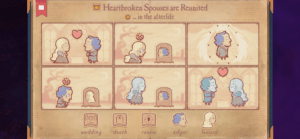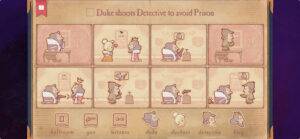The game I played this week was Storyteller which is a game on Steam, Mac, iOS, Google Play, and Switch. The game was created by Daniel Benmergui and is catered toward teens. Books are a puzzle for some where the ending and story plot points all come together perfectly, like a puzzle. Players of Storyteller are explorers that want to design and solve the puzzles that are stories. The game’s design where players write the story given a basic template with characters allows players to have fun through a narrative experience of telling their own compelling story.

The mechanics of the game are the given prompt that the player must follow (e.g., “Three heads roll”) so the player can progress and finish that page of the chapter. Given 2-4 characters and 2-4 setting scenes pushes players to think of their own storylines, and the opportunities are so limitless with the general nature of the game, that the player’s creativity is the main thing that shines through when they tell their story. The dynamics of the game include feedback from the game if you are not in the right direction with your plot, because you never finish the page (which is represented by receiving a crown next to the general prompt as seen in Figure 1). When I was building my story, at times I found myself with the excluded middle design issue (discussed in “Designing the Puzzle” article). This puzzle is very difficult because of the storyline’s dependence on cause-and-effect relationships, requiring the player to recognize that there is a formula the game wants you to follow, and at times, figuring out this formula was difficult because of how open ended the prompt seemed to be, but there was a direction we were led towards. “A” causes “b” which causes “c” and then “d”, so if you put down a scene for a that is meant to be c, then you have to rearrange the puzzle and reconsider the plot you had in mind at first. An example of this is the following where I wanted to simply have the duke shoot the detective at the first scene, but because this isn’t how the story should start, in the second slide, you don’t see the gun. If you don’t follow a general idea of what the game wants, then the puzzle won’t “fit” properly.

In Figure 2, you see how I didn’t follow the direction that the game wanted me to go in, and thus I never actually completed the plot line as the game’s design necessitated. This game reminds me of other games in the narrative puzzle genre like Golden Idol. In Golden Idol, you pick up clues to bring context to the story, but this game is unique because you have to write multiple stories that usually come together for a chapter. I think the flaw with Storyteller is that by guiding your direction, at times, it does feel like curiosity and creativity is challenged by being limited to the bounds of the game and the direction the game wants the player to go in.
In Storyteller, the puzzle mechanics which allows players to arrange a plot with given character and scene mechanics within narrative constraints create a tension between open-ended creativity and predetermined solutions, shaping the player’s experience as both a storyteller and solver of a fixed narrative.
Ethics
This game makes assumptions about the kinds of knowledge existing “inside the box” because players have to have an idea of drama media in some sort of capacity or a general sense of literary conventions. Similarly, there were assumptions of all the characters being in heterosexual relationships (duke marries the duchess, baron marries the queen) and this literary convention only adds to the problematic idea of the nuclear family and what it “should” and “can” look like especially in stories we normally hear growing up.
A lot of these characters in the shows also deal with Western literature’s ideas with kings and queens and dukes. Therefore, the designer of Storyteller makes the assumption that the player will know what the main mechanics are, because the designer of the game is assuming the player has an idea of how the mechanics of the games work together dynamically, and this assumption in particular is quite harmful.




